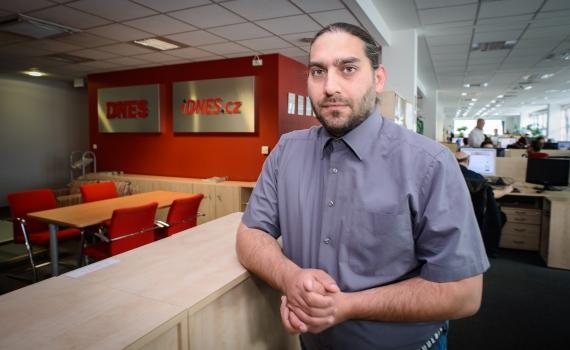Recently the news reached me that an infamous hater from Prostějov had once again not paid attention behind his keyboard and had begun to send threats to the police, to prosecutors, and even to judges – my first reaction was “So, they’ve apprehended Rozsíval – again.” As is his usual modus operandi, the hater had once again chosen particular VIPs to target with his threats.
I had a feeling of déjà vu. That very same Aleš Rozsíval has sent threats to me, to my twin brother, to journalists, to politicians, to musicians and to so many other people that it would take a whole other article just to list them.
Thanks to the persistence of our attorneys, Mgr. Petra Vytejčková and PhDr. Klára Kalibová, Rozsíval was apprehended, and last winter he was convicted and put on probation for 30 months. One would have thought such a punishment would be enough and that anybody would learn their lesson from it.
Apparently some people cannot learn. The Internet and its apparent anonymity are too great a temptation for them to resist.
Rozsíval, according to media reports about him, has used a simple tactic for his latest exploits. These report that when a friend of his uses Rozsíval’s computer to check his e-mail and forgets to log out, the convicted abuser then has access to another online “identity” and begins sending out his threats.
He has been relying on an open wifi network to do this. Yes, Mr Rozsíval is probably not an absolutely normal case, because he has left so many traces behind him online that if the court were to actually review them in depth – including the fact that he once ordered a murder online – he would probably have to sit in prison handcuffed to his own bed.
What is essential here, however, is the identity he used online. He actually believed he was untraceable, and that is exactly how he behaved.
Violence committed through the Internet involves two aspects. One is its apparent anonymity for the user, and the other is the user’s feeling of absolute freedom of speech, which haters erroneously explain to themselves as meaning they can say anything, to anybody, anywhere, in any way.
These people do not think through the fact that the Criminal Code also applies online. In other words: a threat of death (or of violence, which essentially is considered the same thing) remains a threat of death irrespective of whether you shout it at somebody or write it on Facebook.
The police should take action in such a case. In Rozsíval’s case, they did not take action for years.
Rozsíval made his threats all around, therefore. Did most complaints about his behavior end up handled in local misdemeanor proceedings?
Yes, that’s the reality. Here in the Czech Republic, in short, we do not know how to punish hate-motivated violence.
When such violence is committed online, it’s almost impossible to see justice done. Rozsíval was not prosecuted for a very long time, and he could never have been given a higher punishment on mere misdemeanor charges.
If the police (or anybody else) had taken action in time, this abuser might never have sent threats either to me, or to my brother, or to anybody else, because he would have been glueing envelopes in prison somewhere. Paradoxically, the last threat he ever made against me (using another identity, course) was sent on the day before he was tried for the very first time.
Rozsíval wrote that if I didn’t withdraw my lawsuit, he would run me over with his car. It’s probably difficult for a nationalist like him to imagine a life in which you actually have no idea who is lying in wait for you where – but that is something minorities know about here in the Czech Republic.
Many years ago, a man named Martin Kubák threatened to kill me and my son, who was nine at the time. When taking my statement, the detectives asked me, in total seriousness, why I had not yet hired private security guards to accompany my son to school.
The detectives asked me that after I had just explained to them that I can deal with threats against myself. However, if somebody threatens my child, I am actually afraid, and so I want the police to protect my child.
The powerlessness I felt at that moment cannot be described. My child was being targeted with death threats, there was nothing I could do about it, and the police did not want to do anything about it either.
Kubák’s prosecution was eventually conditionally halted. That took two years.
After the In IUSTITIA organization intervened, the matter came before a judge, who convicted Kubák and put him on probation for his online violence. It was the first such punishment handed down in the Czech Republic.
After about a year, Kubák began to send me threats online again. What does his case have in common with that of Rozsíval?
Police were unwilling to address the matter in both cases, then there was unwillingness to bring the matter to trial in both cases, and eventually, the sentence in both cases was one of mere probation. Where does the error lie?
Rozsíval, for example, had been brought up on six different misdemeanor counts for this behavior before the misdemeanor commission in Prostějov prior to his (first) criminal conviction. Of those six proceedings, he was found guilty just once and fined CZK 500 [EUR 19.55].
According to the indictment, after that fine was handed down against him, Rozsíval told then-councillor Milada Sokolová of the Civic Democratic Party: “You’re going to be hanged after the elections. We will form a coalition and you will hang.”
Rozsíval has made similar threats against Jana Černochová, from the same party, as well as against the music reporter and publicist Jaromír Merhaut. He even attempted to hire a hit man online to murder Merhaut.
Are you also amazed that none of this was enough for police to intervene far earlier and more forcefully? Ok, let’s allow the view that Rozsíval “didn’t actually do anything”, i.e., committed no physical violence.
Who will assess all that he has actually done, though, to the people whom he has threatened online? Is it possible to admit that these people might have feared him?
He once appeared on a television competition, where he behaved like a psychopath. In his communications with me personally, he behaved like even more of a psychopath, capable of doing anything.
Is that enough? Or is it not enough?
I am now waiting to see how Rozsíval turns out this time. To be honest, I hope he will be sentenced to at least 10 years in prison.
He has caused enough damage and spread enough fear around him. Many people would certainly be relieved to know he was no longer at large.
Such a sentence would also send a signal to all online haters, and maybe others out there would think twice before writing threats to somebody. These people need to see that online violence results in prison time.
First published in Romano voďi magazine.

